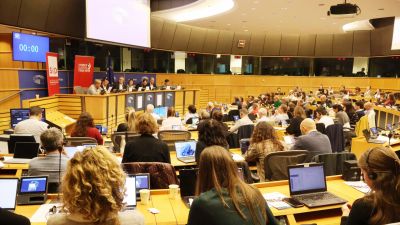“My colleague Mykailo died on the GHdC construction site in Charleroi on 27/9/21. He was Ukrainian and was working here in Belgium as a worker posted by a Polish company for which he had not performed any work in Poland. This company subcontracted to a firm registered in the Netherlands, which had no workers. The investigation revealed numerous violations of code. The Polish company no longer exists and did not report the accident to the Polish social security authorities. As a result, four years later, the family is left with nothing. Without compensation, his wife had to find work abroad, his son joined the army and his daughter is alone in the village.” – Renaud, construction worker, Belgium.
“Working in agriculture in Spain means 9, 10 or even 12 hours a day under the sun, in temperatures of over 40 degrees. It is a hard job. But what makes it truly exploitative is the role of gang like intermediaries. Farmers deal with them to have a regular flow of vulnerable workers to exploit. One call, and they have 200 people ready to work. The intermediary charges €0.50 for each hour worked by each worker, €6 per day for transport, and up to €180 per month for an accommodation which is always deplorable and overcrowded. They truly act as gangmasters.” – Rachid, agricultural worker, Spain.
“Subcontracted workers who work for DHL have to be extremely flexible. They’re often notified at the last minute that their shift is cancelled. The subcontracted drivers never know for sure if they will work or not.” – Chris, driver, Belgium.
These are just some of the testimonies shared by workers at the European Parliament, exposing the abuses they face in long and opaque subcontracting chains and through gang-like labour intermediaries. Their experiences reveal a system that enables exploitation, wage theft, unsafe conditions, and union busting, often across borders and with impunity.
“Complex chains of subcontracting and gang-like labour intermediaries drive abuse across numerous sectors. The amount of red tape and complex legal structures involved makes holding those responsible accountable impossible. The Commission is keen on finding solutions that deliver simplification. Our policy proposals would bring exactly that and mean that workers, law-abiding employers and courts can more efficiently do their job,” said Esther Lynch, ETUC General Secretary.
The European Trade Union Confederation (ETUC) and the European sectoral federations EFBWW, EFFAT and ETF, are calling for an EU Directive on subcontracting and labour intermediation to end these abuses and restore accountability in European labour markets, to be proposed as part of the EU Commission’s Quality Jobs Roadmap.
This is a Europe-wide problem that demands EU solutions. Fragmented national rules have failed to prevent exploitation across borders. Only coordinated EU legislation can ensure that workers are protected, and companies held accountable, no matter where they operate.
Topline Policy Demands:
- Limits on Subcontracting Chains & Direct Employment for Core Activities
Subcontracting must be limited to one or, in exceptional cases, two tiers. Core business activities must be carried out by directly employed workers. Labour-only subcontracting and financial subcontracting should be prohibited. This would prevent the dilution of responsibility and the fragmentation that enables abuse.
- Full Chain Liability
The Directive must ensure that every company in the subcontracting chain, from the main client to the last subcontractor, shares responsibility for violations of workers’ rights. If a worker is underpaid or injured, they shouldn’t have to chase down which company is to blame. The entire chain must be accountable, so workers can get justice quickly, and companies can’t pass the buck.
- Regulation of Labour Intermediaries
Labour intermediaries must be registered, regulated, and held to clear standards. Gangmaster practices and fraudulent postings must be banned. Intermediaries should not charge workers for recruitment, travel, accommodation or training. In high-risk sectors like construction, agency postings should be prohibited altogether.
- More effective and frequent labour inspections
The Directive should ensure increased for inspections and require Member States to use cross-checking of data between enforcement authorities to identify potential labour abuses.
These measures would directly address the abuses workers testified to today: ensuring that no worker is left without protection, and that companies cannot outsource responsibility for rights violations.
Trade unions call on the European Commission to include this Directive in the Quality Jobs Roadmap and the upcoming Labour Mobility Package.
Worker quotes:
“I am a delivery rider for Lieferando. My company has recently just announced a major restructuring that entails the subcontracting of its activities to a third party in 34 German cities. This restructuring will likely lead to cutting costs, and escaping collective agreements and limiting employer liability. This decision will likely have a negative impact on wages and working condition of delivery riders that will work for subcontractors, making them more precarious. These workers will continue to work as before with the same performance requirements, but based on experience in similar situations their rights and conditions will be less favourable than direct Lieferando workers.” – Semih, delivery rider, Germany.
“Wage theft is a daily reality faced by subcontracted workers in my company. When a subcontractor goes bankrupt – and it happens a lot – the workers lose everything. Some are even left on the street. The very next day, there is already a new contract in place with another subcontractor. It is workers who pay the price.” – Amazon worker who preferred to remain anonymous.
“Across most building sites in Belgium, you see a tiered system. Subcontracted workers are paid less and have no-where to go if they face problems, no matter how serious. They are truly on their own.” - Luis, construction worker, Belgium.
ENDS
For further information:

